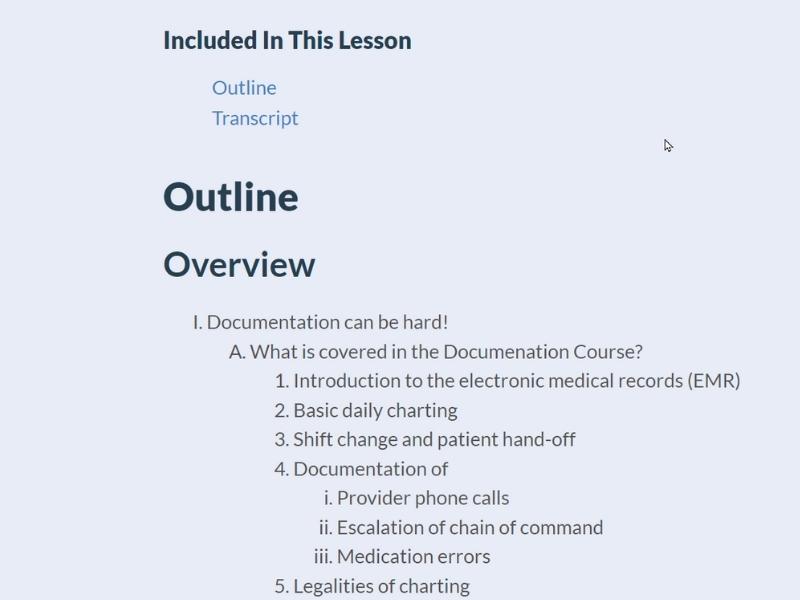Your first year as a nurse will be one of the most challenging years of your nursing career.
Inexperience coupled with so much new information will test you mentally, physically, and emotionally.
It’s not all doom and gloom. Taking the right steps will help make your transition from a new grad nurse to an experienced nurse much easier.
How to Survive Your First Year as a New Nurse
To survive your first year as a new nurse, you should consider a new nurse course, ensure you have the right gear, and network with your coworkers.
Below I’ll discuss these tips in more detail, plus some other important tips you should consider.
Trusted by 430,000+ future nurses and new nurses everywhere. Check out the course that helps new nurses bridge the gap and transition smoothly to becoming nurses.
What does it cover?
Just to name a few.
1. Get a New Nurse Course
This is an option I wish was available when I graduated from nursing school, but unfortunately, it wasn’t.
A new grad nurse course (like this one) is a course that’s designed to help new grad nurses transition to becoming independent nurses.
You might ask, “why would I need a new nurse prep course when I have all my notes and study material from nursing school or taking the NCLEX?”
The reason is that your notes and study material from nursing school were geared towards passing nursing school exams and the NCLEX.
While you can use them during your first year as a nurse, you’ll discover they’re not as helpful.
If you think about it, it makes sense. Unlike The New Nurse Academy, your school test books were never meant for use by practicing nurses.
2. Get Good at Charting
Do you remember that saying from nursing school, “if you didn’t chart it, it didn’t happen?”
Well, let me tell you something, that statement is very true.
Lawsuits happen. Interestingly, those lawsuits tend to occur months or years after the fact. Memories will be fuzzy, and even if they weren’t, the courts would go by what’s written in the charts.
If you want to learn good nurse charting principles, I have a couple of options.
The best option is to check out this course covering everything you need to know about nurse charting and documentation.
There’s also a good section in there about the legalities of charting.

The other option (that’s FREE) is to read the article I wrote that covers some very important nurse charting tips.
It’s not as comprehensive as the nurse charting course, but if you’re on a budget, you should start there.
3. Focus On Your Personal Finance
If you haven’t already started, you need to learn about personal finance. You need to know how to budget all that money you’ll start making as a new nurse.
Learning about personal finance will teach you how to save for the things you want (vacation, fancy house) and the things you need (saving for retirement).
If you’re not interested in learning about budgeting or personal finance or don’t know where to begin, here are some quick options.
Quick Action Steps
1. Find a Financial Advisor
You can go here to find a financial advisor that will help you plan for retirement and for your short-term future, like that vacation you want.
2. Start Budgeting
The next thing you’ll want to consider is to start budgeting.
There are several ways you can get started. You can read this article all about budgeting your money as a nurse.
Then you can start by signing up for a service like Mint that will help you aggregate all your accounts to one place and start seeing where your money is going.
3. Start Saving
My next piece of advice is to start saving a little bit of your money.
You don’t have to do anything super fancy. Just start putting money away into a high-yielding savings or money market account.
4. Start Investing
You know how to budget and how to save. The next thing is to start investing that money so it can really start growing.
There are many investment platforms available, such as Acorns or M1 Finance. If you’ve never invested before, Acorns is the easiest one to get started on.
In less than 5 minutes, you can set up an investment or checking account to start investing your spare change.
Why you should consider Acorns.
Below I’ve listed some of the more popular financial articles I’ve written.
I hope these articles will inspire you to take action or at a minimum, find a financial advisor who will guide you moving forward.
4. Buy the Right Gear
If you want to start your first year of nursing school right, you need to make sure you have the right gear.
Unfortunately, most new nurses don’t have the best gear because they couldn’t afford it when they were students.
There’s no shame in that. I was in the same boat.
Now that you’ve graduated and will have the full patient responsibilities on your shoulders, you need to upgrade.
The most important upgrade is to get a better stethoscope.
I prefer Littmann stethoscopes, but brands such as MDF or ADC would also work.
You don’t even need anything expensive. The entry-level Littman Classic III would be a good option for any new nurse on a budget.
The Classic III is a good and affordable starter stethoscope for any new nurse.
If you have more room in your budget to play with, I would highly recommend getting the Littmann Cardiology IV Stethoscope.
It’s a little pricier, but it’s a much better stethoscope. It’s probably worth considering if you’re moving into a high acuity nursing specialty.
Littmann does also make a digital stethoscope.
It’s expensive, but the beauty of that stethoscope is that between the 40x sound amplification and the noise-canceling capabilities, it’s one of the easiest stethoscopes on the market to hear and see heart sounds.
Littmann CORE Digital Stethoscope
One of the best stethoscopes on the market. 40x sound amplification and a noise cancellation feature that reduces unwanted sounds make this one of the easiest stethoscopes to listen from.
The next thing you should focus on is to make sure you have a good pair of shoes and probably to look at getting a good set of scrubs.
Poor quality shoes will cause you to have foot problems later. Ill-fitting scrubs mean you’ll either won’t look as professional, or it just won’t be as comfortable as some other scrubs.
I have a couple of articles you should consider checking out on the best shoes for nurses and another one that covers the best scrubs for nurses.
For other new nurse necessities, check out this article I wrote over the 15 Must-Have New Nurse Essentials.
5. Get to Know Your CoWorkers
Unless you’re an overly happy person, you’re not going to like everyone in your department.
I would go as far as to say that your feelings towards your nurse coworkers will probably fall somewhere in this hypothetical chart below.

Regardless of your feelings towards your coworkers, life will be a lot easier for you if you still take the time to get to know your coworkers and take an interest in their life.
Nursing is one of those fields where the people you work with are people you’ll probably see the most in your life (even more than your family at times).
It doesn’t even matter if you’re not a team player. There will be situations you’ll have to rely on your peers for support.
How to Win Friends and Influence People (BOOK)
One of the best books out there on how to talk to people and build relationships. If you’re someone who struggles with that check out this book.
If you struggle to work with people or make friends at work, check out the book How to Win Friends and Influence People.
It’s the book so many others (me included) have turned to for learning how to maintain personal and professional relationships.
6. Find a Mentor & Start Networking
Some facilities already have a mentoring program for new RNs and LPNs.
If they don’t, try to find a more seasoned RN or LPN willing to take a new grad nurse under their wings and show them the ropes.
Don’t be afraid to ask someone directly if they will mentor you. Most will view this as a compliment!
As for networking, it’s similar to getting to know your coworkers, but this is for more professional matters.
7. Learn to Prioritize
Learning to prioritize is one of the hardest parts of nursing that many new nurses struggle with.
Each shift, you will have objectives you must complete before the shift is over.
The question will not be which tasks can I choose not to do. The question will instead be which task needs to be done first, second, third, etc.
Regardless of where you start your care med-surg nursing, ICU, psych nursing, etc., each specialty will require learning to prioritize a little differently based on the particular nursing specialty.
Because this is a common struggle for new nurses, there’s a course that’s available that will guide and walk you through learning how to prioritize.
It’s a great course that covers many different topics as well.
8. Focus On Your Self-Care
It’s easy to get overcommitted in both your personal and work life if you’re not careful. It’s a very nurse thing to do to focus on taking care of others that you never get a chance to take care of yourself.
I want to give you permission and encourage you to make sure you’re taking care of yourself.
REMEMBER, only when you’re taken care of yourself can you truly have the capacity to take care of your patients and those in your life you love.
I’ll list below some articles that cover some very common health-related things for nurses.
9. Remember That Healthcare Is a Business
Some of you guys are very altruistic. You have the best intentions in the world. You think You’re going to help everyone and everything.
Then you graduate from nursing school. Start working and realize the cold truth.
Healthcare is a business.
Whether the hospital system is for profit or not, its end goal is to make money.
Of course it doesn’t mean good things aren’t happening.
It also doesn’t mean people aren’t getting helped. Nor does it mean you shouldn’t show up to work each day with the mindset of serving patients and their family members to the best of your abilities.
It’s just something you should keep in mind as you progress throughout your career and have to start making important choices surrounding your career.
10. Don’t Be Afraid to Change Jobs
I firmly believe most people fall into two extreme camps. They either job hop way too much (excluding contract work), or they stay at a job way too long.
Ideally, you should stay at your first nursing job for probably 2-3 years before going somewhere else, but that’s in an ideal world, and we don’t live in an ideal world. We live in the real world.
In the real world, sometimes things just don’t go as planned.
There are three scenarios where you should consider leaving a job as soon as possible.
- The job is very toxic.
- You’re being treated very poorly. This could be verbally or physically.
- You’re not getting trained.
There’s a right and wrong way to do this.
I’ve written articles on how to quit your nursing job, but the main thing you need to do is to try to secure another job beforehand and make sure to give a two-week notice.
Even if you’re still on orientation, make sure to give your notice.
There’s a job board on NurseMoneyTalk, so go check out that job board and start looking for your next nursing job.
Key Takeaways
Your first year as a new grad nurse will be challenging. There’s no way around that.
Following the tips I’ve mentioned above will make your first 12-24 months as a new nurse go by so much more smoothly.





